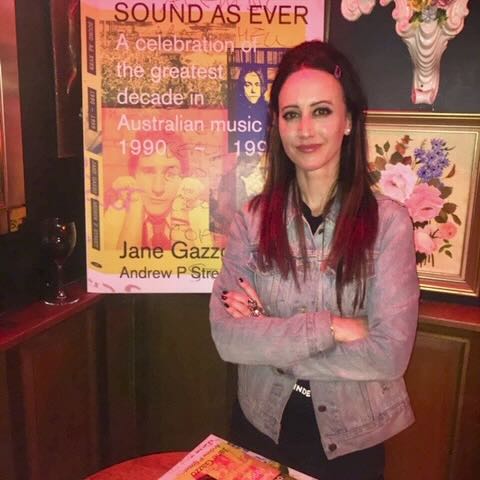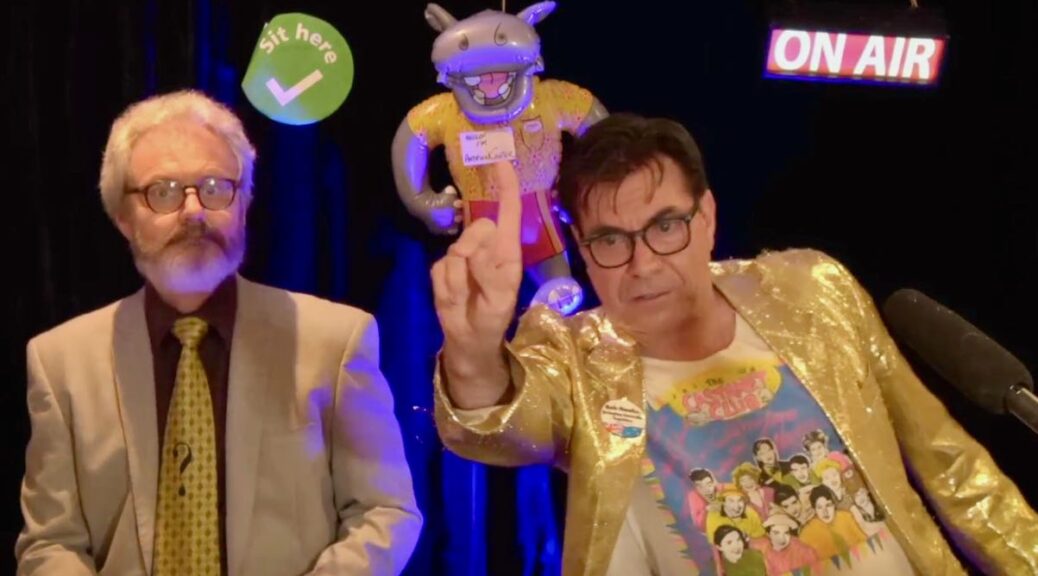Podcast: Play in new window | Download
Subscribe: Email | TuneIn | RSS
A new book from longtime music industry insider Jane Gazzo fills in Australian music history from a time before oversharing became endemic. Sound As Ever: A celebration of the greatest decade in Australian music (1990-1999), a book with Andrew P Street covers most things that you should know about the optimistic musical decade that was dashed against the uncaring digital rocks of the 21st century.
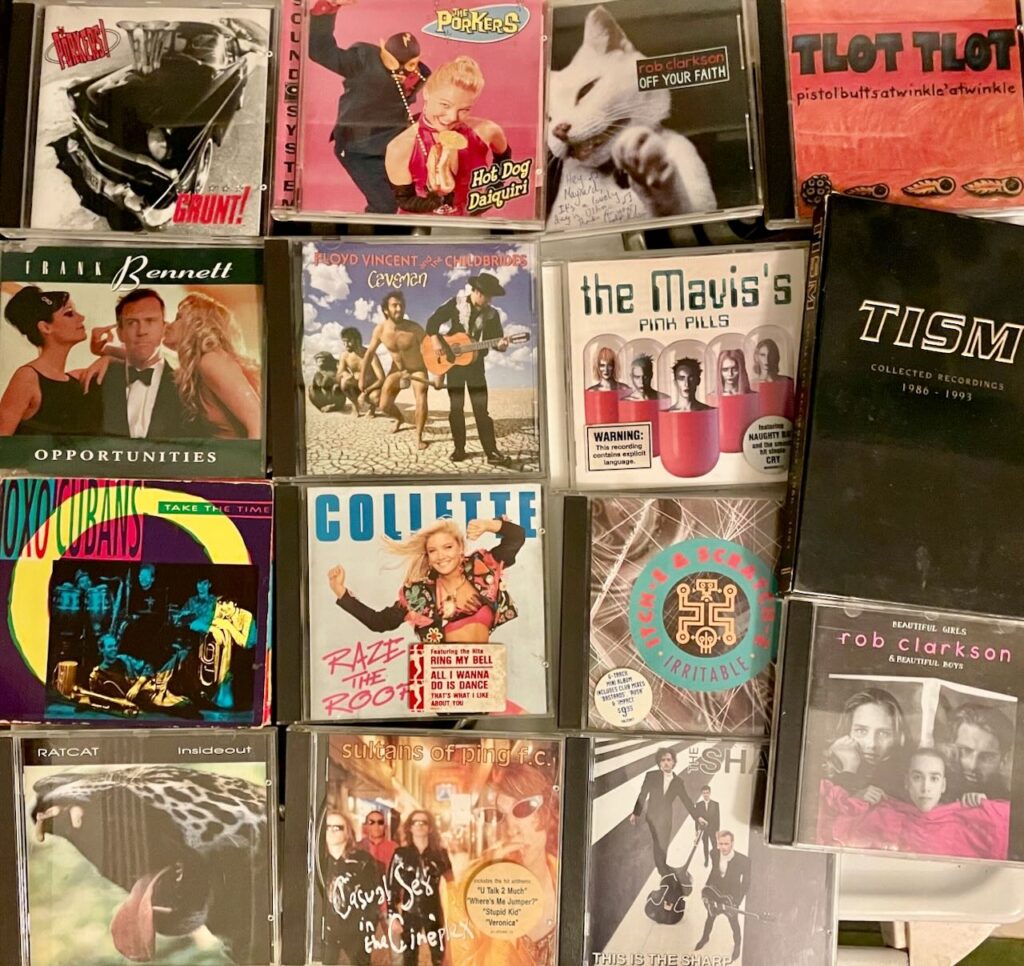
Maynard: With the Australian musical landscape, sadly, experiencing a slight, lack of interesting musical punters, one woman has stepped forward to toot the collective horn of the dark yet simultaneously blindingly colourful decade known as the nineties. Jane Gazzo has done that and been there. From inner city beginnings at Melbourne’s legendary 3RRR to Triple J, Triple M and BBC Radio, through to you seeing her on ABC’s Recovery on a Saturday morning and Channel V and Music Max on Foxtel, you probably know of Jane.
But have you ever shared a flat with her? Well, I haven’t either, but Sharky from The Prodigy and Courtney Love have, and all of them are better people from the experience. She’s written for Q magazine, but more importantly, Dolly magazine. Jane has published a book on John Farnham, but a new epic nineties book Sound As Ever – a celebration of the greatest decade in Australian music, 1990 to 1999, please make welcome my favourite Latrobe University graduate with a Bachelor of Arts degree in cinema that strangely has not yet won an Academy Award. Talk about robbed! Welcome Jane Gazzo!
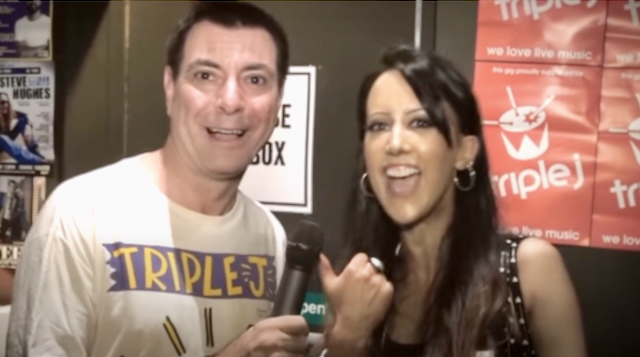
Jane Gazzo: Thanks Maynard, you are my favourite purple-suited presenter slash broadcaster.
M: I think you’ll find it’s aubergine. It’s great to be chatting to you once again. We bumped into each other at the Triple J 40th catchup party. That was the last time I think I saw you.
J: Oh, that was sooo long ago Maynard.
M: There was no one documenting that. There was no person from ABC Radio. There was no person from ABC TV. You had staff from 40 years of Triple J all in the one room.
J: It was a crime.
M: Some of those people are no longer with us. I’m glad that you are making your moment with the nineties here. Look, I was talking to a couple of people about this, Glenn A Baker, he reckons the seventies were the greatest decade in Australian music. I mean, you’re ignoring the work of Mother Goose. Even though they are from New Zealand. Richard Wilkins told me that the greatest decade in Australian music was the eighties and you can’t really deny the work of Joe Dolce. He did replace the Pope when he got shot that time, which is even better than an ARIA award in my book, you are ignoring a lot there for the nineties. So you gotta make your case. What’s so great about the nineties, Miss Pineapple-and-Vodka-Drinker?
J: It is a bold statement, I grant you that and yes, look, the eighties were fabulous but for me the nineties was the last decade of innocence. And by that, I mean, we didn’t have camera phones, we didn’t have mobile phones. Record companies had so much money to spend on bands and they pretty much did spend money on bands and the Australian music scene was in a really healthy state. But as the year 2000 progressed, that innocence seemed to dissipate.
M: Do you think the record companies spent their money wisely?
J: There was some flippant signings. I mean, The Sharp, let’s be honest.
M: Look, I will not hear a word against the black skivvy wearing legends from Melbourne.
J: Scratch My Back, baby.
M: Don’t deny Train of Thought.
J: No one remembers Train of Thought Maynard. I think it was an interesting time because you would go to a gig in the nineties and you would notice the A&R men – and they all were men – by the bar, basically seeing who had the fattest cheque book in their pocket.
M: There was something in their pocket, that’s for sure.
J: I’m just saying it was healthy. There was a lot of community, there was a lot of camaraderie.
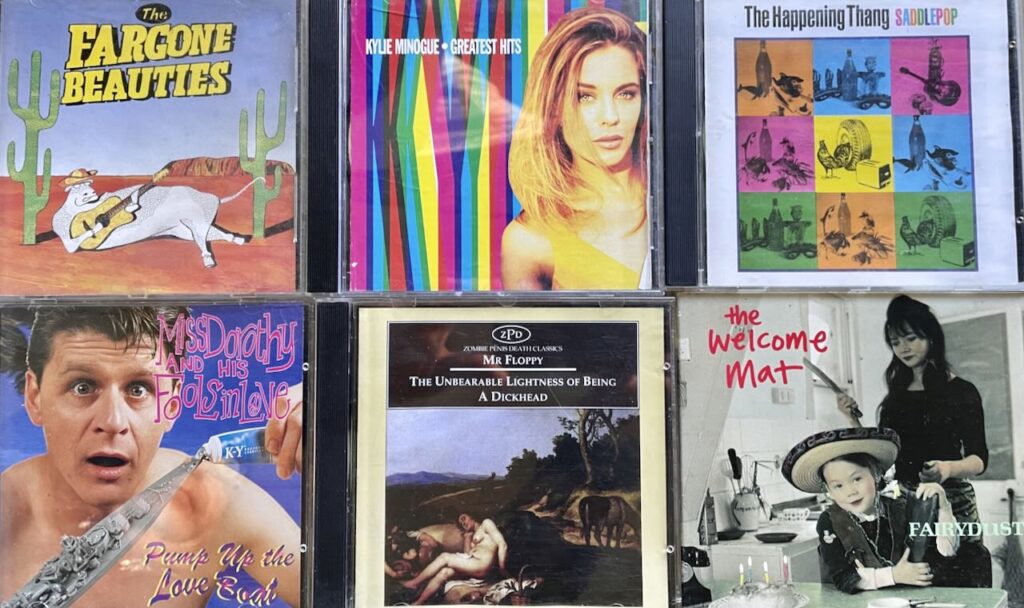
M: You, you did a lot of stuff on recovery of course. So a lot of people were watching you bleary eyed on a Saturday morning and you would’ve been exposed to so many new bands of all varying talent.
You would get a band on (Recovery) and you would never see them or hear from them ever again.
Jane Gazzo
J: Varying talent. Sometimes you would get a band on and you would never see them or hear from them ever again. A band that I remember appearing on recovery was a band called Cool for August. Now they weren’t Australian, they were American, but obviously the record company here were putting in thousands and thousands of dollars to launch them here. They never did anything.
M: What were they called?
J: Cool for August and I only remember that because they had eyeballs on the Recovery set. We used to recreate a lot of the CD single covers. We never heard from them again. Then there was things like Sin Dog Jellyroll out of Adelaide, the most stupidest band name ever. Sin Dog Jellyroll. Where are they now? I should have probably investigated it.
M: One of the things you have got in the book is the Where Are They Now? section, even bands I’d never heard of.
J: You get a mention in the book Maynard, because it was you that introduced me to the artistic delights of Tlot Tlot.
M: Tlot Tlot and Rob Clarkson, I loved championing music on Triple J that wasn’t even on their playlist at the time and Tlot Tlot were a lot of fun. Always good, always up for a joke. My partial nineties list of bands goes a bit like this: Itch-E and Scratch-E, Mr Floppy, The Mavis’s, TISM, Oxo Cubans, Tlot Tlot, Rob Clarkson, Area 7, The Porkers, Caligula, Ratcat, Frente, The Killjoys, The Sharp, Collette, Bjorn Again, Falling Joys, Floyd Vincent, Frank Bennett. There you go.
J: Where’s Things of Stone and Wood in that list?
M: Happy Birthday, Helen… You’ve been probably torturing yourself with nineties music in your head while you’ve been writing this book. Is there one that got stuck in your ear? And you thought “not this again”.
J: It was more of how did I forget this song? I actually fell in love with the Canberra band Sidewinder all over again and their track Titanic Days. I forgot how brilliant it was.
M: One thing you mentioned fairly early on in the book is that the nineties had a real feeling of optimism, that just isn’t happening anymore.
J: I’m so glad you mentioned the optimism Maynard because everywhere there was optimism, certainly after we came out of the recession that we “had to have”. Paul Keating was our new Prime Minister. There was a sense, as I mentioned that the record companies had money and if you formed a band, you could pretty much live off the takings of being a musician. The music scene was so vibrant and so healthy that anything was possible. And a lot of those bands that I interviewed for the book really talk about that optimism and that sense of we can do anything we can get as big as we can. Which is why bands like TISM became so big, bands like Spiderbait and You Am I. There was this optimism.
M: Well, that’s certainly gone now.
J: Yeah, I think it’s wavered somewhat.
M: You’ve got the double whammy of venues disappearing and people not wanting to go out.
J: It was the bloody pokies, wasn’t it? That was introduced in the late nineties that saw really great venues just forfeit the stage for pokies because they realised that they could make more money from them. … I’d say every 20 years there’s a revolution. I’m hoping that with the recent global pandemic, there’ll be a new revolution and we’ll find those protest songs and those bands will start coming out of little tiny warehouses again, and the scene will reinvent itself.
M: I really hope that’s the case, that’s the kind of thing I’d like to see. I just wonder whether a lot of the experts and people with experience have left the industry.
J: They all got out of it during the pandemic because they weren’t making any money and they realised they couldn’t make any money. So they had to change careers had to go into different fields and now there is a real, genuine skill shortage. What are we gonna do about it Maynard?
M: I think if one band can do anything about it, it’s TISM – This Is Serious Mum – and they kick off your book in a pretty major way with a complaint letter from Bruce Ruxton from the RSL Association of Australia to Shock Records complaining about their record.
J: It was so brilliantly done. TISM released a single called Australia, the Lucky C*nt, and wrote that word on their CD single.
M: But also to boot, they had a knock off of a Ken Done koala shooting up heroin on the front cover. So you had copyright infringement as well as offence, which is always a good double banger.
J: But you know, what is so hilarious? I talk about this in the book, that Ken Done didn’t take offence to the fact that TISM copied his koala and his koala had a syringe hanging out of his mouth, he took offence to the fact that they copied his sun, suddenly he was copyrighting the sun. … So Ken Done owned the sun apparently in the nineties.
M: Oh, I guess that’s on most of his tea towels.
J: Yes, Bruce Ruxton. They actually sent a copy of the single to Bruce Ruxton in the hope that he would get his knickers in a knot and low and behold, he walked right into it. He received the CD single with the four letter word on it and wrote a letter which said it should be banned and they used that to get more publicity for themselves.
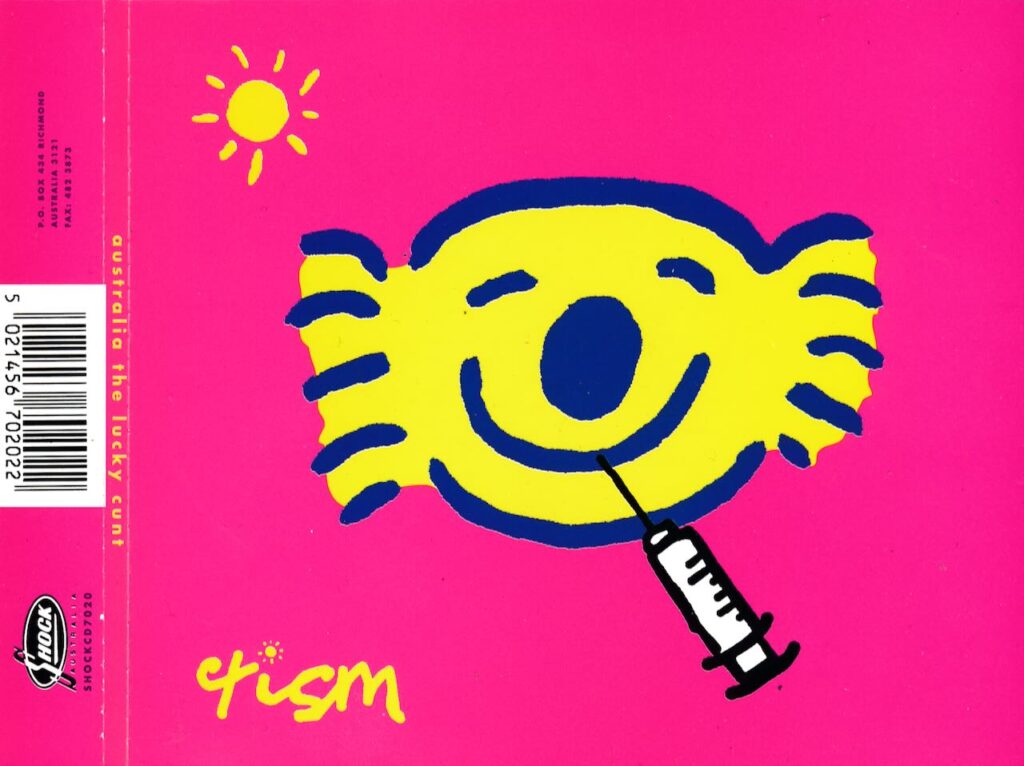
J: Can we just pray silence please for the sad news of the first lady of music television in Australia, Basia Bonkowski or Rendall as she was known, of course, the host of the wonderful SBS show, a Rock Around the World.
M: Was she the first?
J: Yeah, I think she was the first and Suzanne Dowling was the second. In the media I think they’ve conveniently forgotten Suzanne Dowling who did Rock Arena. That was absolutely equally as brilliant.
M: As far as I know, you’re the only person in nineties media history, who has put me in the book, why?
J: Because you were so omnipresent in the nineties. I used to listen to your show. You were appointment listening, and that’s when radio was really important. I mean, Triple J had literally just gone national when you started and you were such a breath of fresh air on the radio. Still are, I don’t know how your mind works. You just presented really great radio, and it wasn’t just the fact that you brought really cool bands on the radio. I mean, you were the first one to play and break in this country, Irish band from Cork, Sultans of Ping FC. But you used to do this amazing segment with a wonderful woman, American woman “You’ve got the wrong Sinatra”.
M: Millie Sinatra, a lovely lady, and she would solve people’s problems every week on the show.
J: Well, this is the thing, who’s doing that now on Triple J? I don’t hear any of that.
M: Sultans of Ping FC, yeah. Where’s Me Jumper? The film clip just had a jumper flying in the air. I mean, that’s the kinda thing you want. I remember one day the drummer turned up while I was doing Sunday Afternoon Fever, and I couldn’t believe it.
J: Well, it was because of him being on a, just a holiday. And I think he was staying at Bondi or Bronte or somewhere like that. He’d heard you playing Sultans of Ping so he rang up and he said “Hey, I’m Morty McCarthy, the drummer of Sultans of Ping.” Now I heard that and I was on Triple R at the time. So I remember ringing you and saying, “Can you give me Morty McCarthy’s details? I wanna interview him for Triple R.” And I have to actually thank you Maynard, because you may not know this, but Morty is now a very, very dear friend of mine. He lives in Sweden now and works for Radiohead doing merchandise.
M: Classic example of the unknown consequences of doing something nice.
J: See Maynard, you’ve had an effect on my life without you even knowing!
M: Look, we’ve gotta get back to the fact that Mr Floppy gets far too brief a mention. The album of the nineties was The Incredible Lightness of Being a Dickhead and Bruce Ruxton was on that album.
J: Oh my God. As was Peter Russell Clark, as was James Reyne, they just don’t make them like that anymore. I could have done a whole book on Mr Floppy and TISM alone.
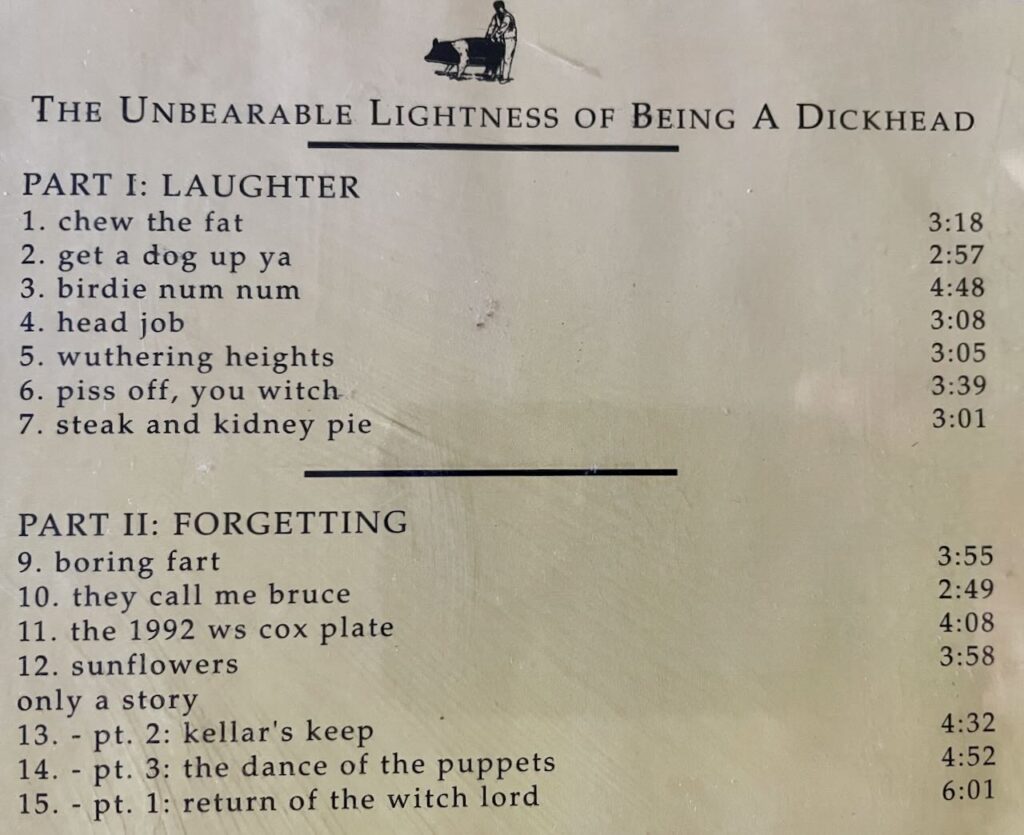
M: I also learned a lot about Ratcat as well, having supported the guys more recently, I didn’t know that they had to spend so much of their own money at the behest of the record company to go overseas and do stuff that was a really bad move for them.
J: Yeah, in the middle of mass teen Ratcat hysteria they were told to go to London, to the UK, which makes absolutely no sense. And of course they never truly recovered once they got back because the kids had moved on, they couldn’t reclaim that fan base. Andrew P Street spoke at length to Amr Zaid, who was one of the original members of Ratcat, for the book and Amr had never told his story before. Amr had never talked about his time in Ratcat ever. He was really chuffed to be able to tell his story. I think he’s very proud of what they achieved in that short time.
M: In December, in a packed Enmore Theatre there, people still love them.
J: It’s fair to say it’s probably just Simon Day, these days. I think Amr and Simon haven’t spoken for years and years and years.
M: Being the music industry, and you said that those two haven’t spoken for a while, did you have to be careful who you spoke to and when you did, what you said? If you were talking to someone in a band and you knew that you shouldn’t mention What’s-his-name or The Interview?
J: Oh, put it this way, when I was doing the Where are they now? I had to be very careful with certain members who didn’t like other members, or who were really still nursing a lot of heartbreak from the breakup of their bands. And I had to be really careful with how I wrote about that. I just had to be really careful that someone wasn’t gonna email me and go “why did you mention that?” But I also wanted to get across the story of the person that was broken hearted.
M: Let’s talk about someone that was done wrong by the industry and that’s Tania Lacy.
J: Mmmmm. Again, another woman who has never told her story.
M: I remember being on the phone to her and Mark, because I was asked to host the show for a while. The first thing I did was ring them and they said, no, no, do it. And I didn’t do it because I supported what they were doing. And as she said, her booting off from Countdown Revolution was something her career never has recovered from.
J: It’s true. She had to take writing jobs to support herself, but she was told never to darken the door of the ABC ever again. She was fired by fax. She wasn’t even allowed to go and pick her things up. And the ABC said that the duo were fired for protesting about bands miming on the show, which was so far from the truth. As she puts it, she was protesting the fact – both her and Mark were protesting the fact – that the ABC were taking contra deals from record companies. Reporters were being flown overseas to interview bands, free trips, free prizes, everything that the ABC Charter states not to do, they were doing.
M: Shortly afterwards, the ABC really cracked down on that kind of thing.
J: As they should have. Tania Lacy was in her early twenties at the time and was being yelled at by these suits in middle management. What do you do? Where do you go? She was so talented. Cruelly wasn’t allowed to ever appear on air ever again. So she fled to, I think it was Sweden, where her husband was from. She’s back now.
M: She’s in Queensland now.
J: There’s a great article in Rolling Stone which I wrote, again based on the fact that herself and Caroline from Dead Star talked about just what they dealt with in the nineties. And so I put it into an article in this month’s Rolling Stone with The Wiggles on the front cover. To really tell their stories.
M: Another show that fell through the cracks was the one that was just on before Recovery, and that was The Factory, Tania was a powerhouse on that show.
J: I love the characters she used to take off. There was a Nana Mouskouri character. That’s where Tiziana Bouboulini was born of course. And she used to interview artists with the most hilarious of personas.
M: And they just chucked the whole thing away.
J: Yeah, very strange times. And it’s interesting because Countdown Revolution was a precursor to what Recovery would become where anarchy was encouraged. But as soon as they asked Mark and Tania to be as anarchic as possible, they got shut down.
M: Anyone who’s been to a Mark Little standup comedy gig would’ve told you what you’d be getting if you asked for him. At the Adelaide Festival, I think one of the rooms was sponsored by the submarine company and he smashed up the sign one night.
You nailed your nineties there with a list of stuff – in the nineties: Taragos, that was mainly the Toyota way of getting around with bands because the people carriers hadn’t expanded as much as they are.
J: When I went to London and people started talking about people carriers, I did not have any idea what they were talking about because I’d always called it a Tarago. I’d only ever known it as a Tarago.
M: The lists people have made of things that were really big, it’s interesting. Phones just don’t appear on the list. Cameras don’t appear on the list. The vodka and pineapple juice, because there were some wacky connections there. And I think even the vodka and energy drink thing was going on then, at the tail end of the nineties as well.
J: See it was Illusion Shakers for me, which I think were mentioned.
M: Were they blue?
J: They were Midori with lemonade and something else. And they were really big in the clubs in the nineties.
M: But I remember it was part of Sunday Afternoon Fever who had the most expensive Subzero, that lemonade.
J: I loved Subzeros, loved them.
M: And at clubs, they were really expensive. And I remember we found, oh, there was one going for as much as $7 at one time.
And also, at this time, I like mentioning that the import record thing was big. Because you couldn’t just click and download stuff from anywhere around the world. You had to go to a shop like Red Eye or many of the great record shops in Melbourne. If you wanted a CD, it could be as much as $45 in 1993 dollars
J: Weren’t record shops such hubs of community? You could go to a record shop and if the guy behind the counter knew you, he would recommend something that he’d know that you’d like, you’d check out all the musos looking at the musos wanted boards. You could find out about gig that were happening. You could get your import stuff. You’d get your street press while you were there. That’s really lacking in today’s world.
M: Yes, Saturday morning at a place like Central Station, you would have all the DJs turning up and all the important ones like Peewee Ferris and people like that would have their records put aside.
J: There is a fantastic map of old Sydney record stores in the book and some are still hanging on for dear life like Red Eye. We all remember our record shops really fondly.
M: Brunswick Street was the go in Melbourne.
J: Polyester was there, there was Sister Ray for a while. Of course, in the city you had Au GoGo and Missing Link records.
M: Missing Link. I remember getting my copy of 99 by Barbara Feldon there. They also released, I think, Kinky Boots, by the Avengers, which I used to play on the radio as well. And whenever a Kylie record was released in the UK about a month or two ahead of us, I’d go and get the import copy and I’d play it first. I liked doing that.
I ended up setting fire to my own bum. That’s what happens when you’re a trailblazer…
Maynard
J: You were a trailblazer!
M: I ended up setting fire to my own bum. That’s what happens when you set fire to your trail and you blaze it!
J: You opened the doors for the likes of me, Maynard, you opened up the doors for us.
M: You did the request show on Triple J of an evening.
J: After Michael Tunn! Remember Michael Tunn? Tunny had left by the time I took over his shift, I think he got burnt out because remember he was doing the Afternoon Show on ABC TV.
M: He was hosting Big Square Eye as well. He was 16 when he first arrived at Triple J.
J: And he was great! I took over from the Request Best and I changed it to Super Request.
M: I started doing the request show on a Saturday night before Tunny got it and it was a really weird thing because there had been no request show on Triple J before they got me to do it for a couple of months before Tunny took over. And the weird thing was you either got two sorts of songs. People would want something that was ultra commercial, or they’d want something that was really obscure. It’s like the audience didn’t know what to do with a request show on Triple J at first.
Michael Tunn had a really interesting way of broadcasting. He would have an FM radio, just a little transistor radio in the studio, and whenever he went to a song, he would listen to all the other major music stations in Sydney, find out what they were playing and try and better the song that they had on.
J: That’s amazing.
M: It means you’re being reactionary. You’re not leading your reacting, but it’s a way to do it. … And what was the weirdest experience you had doing a request show? The Triple J request show when I was doing it, when Tunny was doing it, when anyone does it is not a normal request show.
J: I’m gonna let you in on a secret Maynard: some nights on Super Request when I was hosting, there were no calls. Which is hard to believe because we were nationwide, but some nights we just didn’t have any talent or, you know, they’d ring up and they’d want a song that we couldn’t play or didn’t want to play. Or it was too daggy, too bad, whatever. I can’t believe I’m telling you this … I had this friend that was really good at putting on voices and accents. When we needed some talent on the air, especially Friday nights, I think Friday nights we struggled because everyone was getting ready to go out and I had this friend, Glen, who would put voices and accents on. Well, I, I loved that Radio Birdman song Aloha Steve and Danno. And I had read in the paper that day, that the guy who actually played Steve, the actor on the actual Hawaii Five O show had passed away.
M: Jack Lord! Our Lord and Saviour, Jack Lord.
J: So it was 1998 and he’d died and so I went, oh well, that’s a great segue into Aloha Steve and Danno. Hey, homage to Jack Lord and Hawaii Five O by Radio Birdman. Why not? Great. I rang Glen and I said, “Mate, can you come on and just mention you, you’re a huge Hawaii Five O fan”. I’d always word him up. Uh, Jack Lord’s passed away. Can I play Radio Birdman? He said “Yep not a problem Jane”. He was used to it, coming on and requesting songs. So he got on air, we’re live on air and Glen put on a Chinese accent.
M: Oh no!
J: It’s awfully racist as well, but he just thought he’d take the piss and put on a Chinese accent live on air. Maynard, I lost it, I start laughing, I can’t hold it together because I know it’s my mate putting on a Chinese accent. My God, I had tears coming down my face. I got him on and I got him off, but Jesus, I was pissing myself, no word of a lie. The next day, someone from the Herald Sun was obviously listening and put in the entertainment section: “Jane Gazzo was so disrespectful to a listener who was talking about the death of Jack Lord, not cool, Jane”. My friend was putting on a friggin’ Chinese accent and someone took me to task and wrote about it, that I was the most disrespectful person in the world, ever!
M: By the way every commercial station does that for sure. Because the problem commercial stations have is not so much people ringing up, but ringing up with the right songs that are on the playlist.
J: Oh my God. I know. Well, you know, you and I have both worked in commercial radio when I worked at, um, a commercial radio that will remain nameless, but is still around today, they did this whole campaign: We’re gonna play the songs you wanna hear! So make sure you get in and, and fill in this thing online and tell us all the songs you wanna hear!
And, of course I got excited as a DJ, I went, oh great, we’re expanding our playlist from the 12 Cold Chisel songs and Guns and Roses songs that we constantly play to maybe 20 songs. And I remember my boss coming into the studio while I was on air, which was a crime in itself, but he goes “Have you got something lined up?” and I said, “Yeah, yeah, I’m gonna play Run to the Hills cause everyone loves Run to the Hills and there’s so many requests for it. “No, no, no, no, no, don’t play that, play Garbage.” “But there’s not one request from any male between the ages of 40 to 65 who was requested Garbage.” He’s saying “No, but just ring up someone and get them to ask for it, okay.” And I’m like, “What about Run to the Hills? Cause that’s what people wanna hear?”
M: I know this Chinese guy who really likes Garbage!
J: Such a lie to the audience!
M: The amount of lies in the book that I’ve spotted has been almost zero. The quiz at the end is a good one as well. You’re someone who’s written a few trivia quizzes in your time, Jane Gazzo.
J: Did you get them all right?
M: I actually didn’t do very well in them. Why don’t you throw one out to the listener right now?
J: Who was the host of Creatures of the Spotlight on Triple J on a Monday night? There’s one for you.
M: Peter Castaldi.
J: Correct. And who was his co-host?
M: I’d forgotten there was a co-host.
J: Yeah! Starts with L … Lawrie Zion, you don’t remember Lawrie Zion?
M: Lawrie Zion!
J: Creature of the Spotlight was Pete Castaldi and then Lawrie Zion. I’m sure they worked in tandem together.
M: Now that’s a good question for those nineties Triple J listeners. And I’d like to finish with you making a request on this show and don’t do your Chinese voice again! I’m on to you, Jane. Well, now the radio station would have to hand in its licence. And they’d just dig a large hole there, build a statue of you, then pull the statue down and dig another hole and put the statue in it.
J: It wasn’t me, it was my mate Glen. A request, all right, I’m gonna go Ratcat, That Ain’t Bad because “I love you” – that was the catch cry of the early nineties, and it really for me kickstarted the entire Australian music scene, such a great, great song to go out with.
M: Where can people get the book Sound As Ever: A Celebration of the Greatest Decade in Australian Music (1990-1999)?
J: In all good boutique bookshops, as well as the major chain bookshops, and you can get it online via Melbourne books.
M: I recommend people go along to your website: janegazzo.com and have a good read of what you’ve done, and all little incidents that have gone on. I do like the word that you shared a place with, and you worked for, Courtney Love ‘briefly’.
J: Briefly.
M: So was it the whole day?
J: It was 12 days all up.
M: Would the word ‘mercurial’ be good to use?
J: Batshit crazy is probably better.
M: This book is worth reading, worth having, it’ll settle arguments. Cause that’s one thing, you’ll be at home, you’ll be watching stuff, one person will look at the Wiki, other people will look at YouTube, they won’t have the same answer, they’ll be pushing and shoving, and everyone will be drinking the pineapple and vodka juice, and you can solve the answer by just having this book. Oh, hang on a minute, you supported Hugh Jackman as a DJ?
J: I was his support act.
M: What do you play when you’re supporting Hugh Jackman?
J: Playing stuff from Motown and sixties Soul and eighties stuff. I was having a ball, such a highlight in my life being the support act for Hugh Jackman and on the eighth show when I got off stage for the last time I did a cartwheel down the runway, just cartwheeled all the way back.
M: What song would you finish with?
J: I think I finished with You Can’t Hurry Love by the Supremes.
M: Have you thought of what song we should play for you?
J: Ratcat, That Ain’t Bad.
M: You don’t want to change your answer? You don’t want to phone a friend? Particularly a friend who puts on a fake Chinese accent. I’m not having that guy on the show again!
Jane Gazzo, thank you very much. She’s requested it twice so we have to play it now on the Maynard Request Fest here. Sound As Ever: A celebration of the greatest decade in Australian music (1990-1999) it’s great and so is Jane!
Where to get Sound as Ever: A celebration of the greatest decade in Australian Music (1990-1999)
Sunday Afternoon Fever show 1993 featuring my visit to Mrs Fred Sinatra in Las Vegas.
